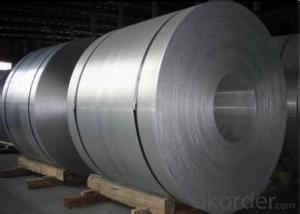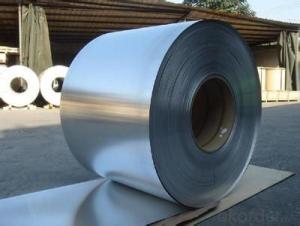Alu roll,mill finish and coated
- Loading Port:
- China Main Port
- Payment Terms:
- TT OR LC
- Min Order Qty:
- -
- Supply Capability:
- -
OKorder Service Pledge
OKorder Financial Service
You Might Also Like
Aluminium is a relatively soft, durable, lightweight, ductileand malleablemetalwith appearance ranging from silvery to dull gray, depending on the surfaceroughness. It is nonmagnetic and does not easily ignite. A fresh film ofaluminium serves as a good reflector (approximately 92%) of visible lightand an excellent reflector (as much as 98%) of medium and far infraredradiation. The yield strength of pure aluminium is 7–11 MPa,while aluminium alloys have yield strengths ranging from200 MPa to 600 MPa. Aluminium has about one-third the densityand stiffness of steel. It is easily machined,cast, drawn and extruded.
Aluminium alloys (or aluminum alloys; see spellingdifferences) are alloysin which aluminium(Al) is the predominant metal. The typical alloying elements are copper, magnesium,manganese,silicon,tin and zinc. There are twoprincipal classifications, namely casting alloys and wrought alloys, both of which are furthersubdivided into the categories heat-treatableand non-heat-treatable. About 85% of aluminium is used for wrought products,for example rolled plate, foils and extrusions.Cast aluminium alloys yield cost-effective products due to the low meltingpoint, although they generally have lower tensile strengthsthan wrought alloys. The most important cast aluminium alloy system is Al–Si,where the high levels of silicon (4.0–13%) contribute to give good castingcharacteristics. Aluminium alloys are widely used in engineering structures andcomponents where light weight or corrosion resistance is required
Specification:
Alloy: AA1050, 1060, 1100,AA3003, 3005, 3015, 5052, 5754, 5083,8011, etc
Temper: H14/16/18/22/24/32,HO etc.
Thickness: 0.2mm—100mm
Width: 100mm—2300mm (Can be slitted)
Inner Diameter:508MM
Coil Weight:500kg-3000kg(Max.)
Application:Foil stock, Circles, Roofing, Can stock, Marine plate,Anti-slipery purpose in vehicles, packing and appliance.
Features:
1. Excellent quality of products
2. Quick delivery
3. Best service to clients
4. BV,SGS avalible
5. No buckle o waveness
6. Tension leveling
7. Certificate of Origin
8. Form A,E
Packaging Detail:
Carton ,Woodenpallet with plastic protection packing ,standard seaworthy packing or as yourrequest.
Production Capacity:
AnnualProduction capacity of 600,000 tons.
Products areexported to United States, Canada, U.A.E, Brazil, Mexico,Thailand, Vietnam,Nigeria etc, over 100 countries andregions all over the world.
Production Line:
CNBM aluminumproduction base is comprised of 18 aluminumannealers, 10 coil and foilmills, 4 continuous production lines, 2hot rolling production line and 3prepainted lines.
FAQ:
1. What is the form of payment?
Normally 30% TT, L/C
2. Type of quotation?
FOB, CFR, CIF
3. Port of loading?
Shanghai port
4. Delivery time?
30 days after client’s deposit
- Q:Can aluminum coils be used in the production of heat exchangers?
- Indeed, the utilization of aluminum coils in the fabrication of heat exchangers is feasible. Aluminum has gained significant popularity as a preferred material for heat exchangers owing to its exceptional thermal conductivity, which facilitates effective heat transfer. Moreover, its lightweight nature and resistance to corrosion render it a durable and enduring choice for heat exchanger implementations. The incorporation of aluminum coils in heat exchangers is widespread across diverse sectors such as HVAC, refrigeration, automotive, and aerospace.
- Q:what properties etc makes us use aluminium as the material behind cans...And why does it have the properties?
- For soda cans, it's relatively inert, flexible enough to handle a carbonated liquid, and can be opened without tools. For food, zinc-coated iron or steel is more common. The field that helps you understand why materials have the properties they have is called physical chemistry.
- Q:What are the different ACP (Aluminum Composite Panel) applications for aluminum coils?
- Aluminum coils have numerous applications in the production of Aluminum Composite Panels (ACP), which is a popular building material known for its lightweight, durability, and versatility. Below are some examples of how aluminum coils are used in the ACP industry: 1. Building Cladding: ACP is widely used as cladding material for building exteriors. The aluminum coils are coated with a protective layer and bonded to a core material, usually made of polyethylene. This combination provides excellent strength, weather resistance, and insulation properties. 2. Signage and Advertising: Aluminum coils are used to create signage and advertising boards. The panels can be easily cut, bent, and formed into various designs and sizes, making them ideal for eye-catching displays and billboards. 3. Interior Decoration: ACP is frequently used for interior decoration purposes. It can be used for wall panels, ceiling panels, partitions, and decorative elements. The aluminum coils can be coated with different colors, finishes, and textures to achieve the desired aesthetic appearance. 4. Furniture Manufacturing: Aluminum coils are used in furniture production, especially for creating lightweight and durable surfaces. ACPs can be used for tabletops, cabinet doors, shelves, and other furniture components. 5. Transportation Industry: Aluminum coils find applications in the transportation industry. ACPs can be used to construct vehicle bodies, including buses, trucks, and trailers. The lightweight nature of ACPs helps reduce the overall weight of the vehicle, resulting in improved fuel efficiency. 6. Industrial Applications: ACPs are widely used in various industrial applications. They can serve as wall cladding in manufacturing facilities, cleanrooms, warehouses, and other industrial buildings. The panels provide insulation, fire resistance, and easy maintenance, making them suitable for such environments. 7. Renewable Energy Sector: Aluminum coils are used to produce solar panel frames. ACPs offer exceptional strength and corrosion resistance, making them an ideal choice for providing structural support to solar panels. In conclusion, aluminum coils are versatile materials that have a wide range of applications in various industries for the production of Aluminum Composite Panels. From building cladding to signage, interior decoration, furniture manufacturing, transportation, industrial applications, and the renewable energy sector, ACPs are extensively used.
- Q:The export aluminum volume is CIF. If there is no insurance policy, how will the customs premium be collected?
- The customs will not charge your premium the premium you can write but if you are a refund if there will be some impact because of the tax rebate minus the freight and insurance premium so you consider the premium but you can write less Never mind if you need shipping or shipping insurance declaration business can contact me oh
- Q:I would like to order 25 micron diameter 99.99% Aluminum wire required to use for making electrical connections. Only several cm are needed, so I would like to purchase a small spool. Delivery ASAP preferable (overnight or two day shipping would be best). This wire will be attached by hand using epoxy and not using a wire bonder.
- If they can't help, try asking the tech support guys at the wirebond manufacturers and the tool manufacturers. KS in the US and Shinkawa in Japan used to be the big guys. You can search for ultrasonic bond tools. You can also check with superconducting research centers; several private and public ones. Researchers might loan you materials and/or bonding support. BTW, Al critical temp is reportedly about 1.2°K, pretty tough to get that cold! U/S bond wire has 1% silicon, partly for hardness, you can probably bond pure wire though. Key is breaking up the oxide. Maybe bonding at cold temps and/or in vacuum would work. Also, I doubt epoxy would be good or superconducting at the temps. Al filled epoxy is unreliable electrical conductor due to oxide formation. Will be a bear to handle such fine wires without a bonder! Good luck!
- Q:Are aluminum coils suitable for cryogenic applications?
- Aluminum coils are well-suited for cryogenic applications. The properties of aluminum make it an excellent choice for use in low-temperature environments. To begin with, aluminum has a low melting point, enabling it to remain solid and maintain its structural integrity even at cryogenic temperatures. This is particularly crucial in applications that involve extreme cold, such as cryogenic storage or transportation. Moreover, aluminum exhibits good thermal conductivity, allowing for efficient heat transfer. Managing and controlling heat flow is important in cryogenic applications to prevent temperature fluctuations or thermal stress. Aluminum coils effectively remove heat from the system, ensuring stable and consistent temperatures. Additionally, aluminum is lightweight and possesses a high strength-to-weight ratio. This is extremely advantageous in cryogenic applications where weight and space constraints are often critical. Aluminum coils contribute to reducing the overall system weight, resulting in improved efficiency and cost-effectiveness. Lastly, aluminum is corrosion-resistant, a vital characteristic in cryogenic environments where moisture or other corrosive substances may be present. Aluminum coils withstand harsh conditions and maintain their performance and durability over extended periods. In conclusion, aluminum coils are indeed suitable for cryogenic applications due to their low melting point, good thermal conductivity, lightweight nature, and corrosion resistance. They offer a multitude of benefits and effectively meet the demands of such challenging environments.
- Q:Can aluminum coils be used in chemical processing plants?
- Yes, aluminum coils can be used in chemical processing plants. Aluminum is resistant to many chemicals, especially in non-acidic environments. It is lightweight, has good thermal conductivity, and can withstand high temperatures, making it suitable for various applications in chemical processing plants.
- Q:Are aluminum coils suitable for weather-resistant applications?
- Yes, aluminum coils are suitable for weather-resistant applications. Aluminum is known for its excellent corrosion resistance, making it a popular choice for outdoor and weather-exposed applications. The metal forms a protective oxide layer on its surface when exposed to air, which acts as a barrier against moisture, humidity, and other weather elements. This oxide layer helps prevent the metal from rusting or deteriorating over time. Additionally, aluminum's lightweight nature and high strength-to-weight ratio make it a practical choice for various weather-resistant applications, such as roofing, gutters, siding, and outdoor signage.
- Q:How are aluminum coils used in heating, ventilation, and air conditioning (HVAC) systems?
- Aluminum coils are commonly used in HVAC systems as they serve as heat exchangers. These coils are responsible for transferring heat between the indoor and outdoor units of an HVAC system. The aluminum coils are designed to efficiently absorb heat from the indoor air and release it outside, or vice versa, depending on whether the system is in cooling or heating mode. The use of aluminum coils in HVAC systems ensures better heat transfer, corrosion resistance, and overall system performance.
- Q:Can aluminum coils be used in roofing applications?
- Aluminum coils are indeed suitable for roofing purposes. The lightweight, corrosion-resistant, and durable properties of aluminum make it a popular option for roofing. In the construction of various roofing systems like standing seam roofs, metal shingles, and flat roofs, aluminum coils are commonly utilized. These coils are typically shaped into panels or sheets, which are then installed on the roof, offering protection against weather conditions and enhancing the overall appearance of the building. Moreover, the reflective attributes of aluminum play a role in reducing energy consumption. By deflecting sunlight and heat, this environmentally friendly roofing choice helps in conserving energy.
1. Manufacturer Overview |
|
|---|---|
| Location | |
| Year Established | |
| Annual Output Value | |
| Main Markets | |
| Company Certifications | |
2. Manufacturer Certificates |
|
|---|---|
| a) Certification Name | |
| Range | |
| Reference | |
| Validity Period | |
3. Manufacturer Capability |
|
|---|---|
| a)Trade Capacity | |
| Nearest Port | |
| Export Percentage | |
| No.of Employees in Trade Department | |
| Language Spoken: | |
| b)Factory Information | |
| Factory Size: | |
| No. of Production Lines | |
| Contract Manufacturing | |
| Product Price Range | |
Send your message to us
Alu roll,mill finish and coated
- Loading Port:
- China Main Port
- Payment Terms:
- TT OR LC
- Min Order Qty:
- -
- Supply Capability:
- -
OKorder Service Pledge
OKorder Financial Service
Similar products
New products
Hot products
Related keywords






























